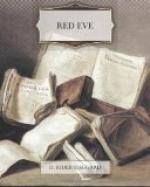“Would you know, Father? Then I’ll tell you. Because I wish to see my daughter set high among lords and princes and not the wife of a merchant’s lad, who by law may wear cloth only and rabbit fur. Because, also, I hate him and all his kin, and if this is true of yesterday, how much more true is it now that he has killed my son, and by the arrows of that wolf-man who dogs his heels, slain my guests and my grieve. Think not I’ll rest till I have vengeance of him and all his cursed House. I’ll appeal to the King, and if he will not give me justice I’ll take it for myself. Ay, though you are old, I tell you you shall live to see the de Cressi vault crowded with the de Cressi dead.”
Sir Andrew hid his eyes for a moment with his hand, then let it fall and spoke in a changed voice.
“It comes upon me that you speak truth, Sir John, for since I met a certain great Master in the East, at times I have a gift of foresight. I think that much sorrow draws near this land; ay, and others. I think that many vaults and many churchyards, too, will ere long be filled with dead; also that the tomb of the Claverings at Blythburgh will soon be opened. Mayhap the end of this world draws near to all men, as surely it draws near to you and me. I know not—yet truth was in your lips just now, and in mine as well, I think. Oh, man, man!” he went on after a pause, “appeal not unto the world’s Caesar lest Caesar render different judgment to that which you desire. Get you home, and on your knees appeal unto God to forgive you your proud, vengeance-seeking heart. Sickness draws near to you; death draws near to you, and after death, hell—or heaven. I have finished.”
As he heard these words Sir John’s swarthy face grew pale and for a little while his rage died down. Then it flared up again.
“Don’t dream to frighten me with your spells, old wizard,” he said. “I’m a hale man yet, though I do lose my breath at times when my mind is vexed with wrongs, and I’ll square my own account with God without your help or counsel. So you’ll not give me my daughter?”
“Nay, here she bides in sanctuary for so long as it shall please her.”
“Does she in truth? Perhaps you married her to this merchant fellow ere he rode this morning.”
“Nay, Sir John, they betrothed themselves before the altar and in presence of his kin, no more. Moreover, if you would know, because of your son’s blood which runs between them I, after thought and prayer, speaking in the name of the Church, swore them to this penance—that for a year from yesterday they should not wed nor play the part of lovers.”
“I thank you, priest, for this small grace,” answered Sir John, with a bitter laugh, “and in my turn I swear this, that after the year they shall not wed, since the one of them will be clay and the other the wife of the man whom I have chosen. Now, play no tricks on me, lest I burn this sanctuary of yours about your head and throw your old carcass to roast among the flames.”




